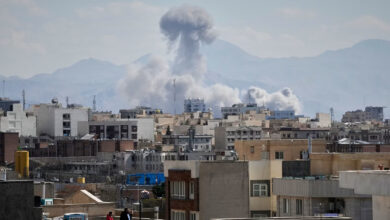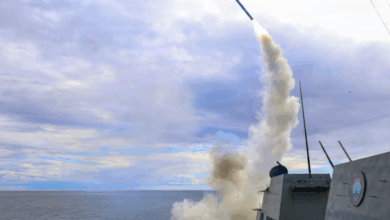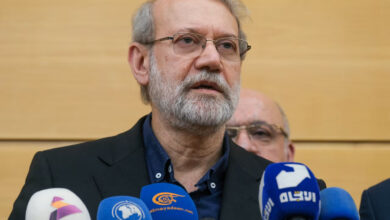Ramallah–The possible release of Marwan Barghouti, the imprisoned West Bank leader and self-styled symbol of the second intifada, could usher in a badly needed new era for Palestinians–or prove another devastating disappointment.
Barghouti’s allies depict him as a potential savior for Fatah, the movement founded by Yasser Arafat that has suffered setback after setback since his death. These include Hamas’s stunning 2006 electoral victory and its armed takeover of Gaza a year later.
“He can win elections and he can also achieve a reconciliation with Hamas,” says Qadoura Fares, a close associate and former Palestinian Authority minister.
Barghouti, a one-time student leader who also played a pivotal role in the early days of the first intifada that broke out in 1987, is perhaps the most prominent among the 980 prisoners whose release is being demanded by Hamas as part of a deal that would set free the imprisoned Israeli Sergeant Gilad Schalit.
Hamas is pressing hard on Israel to include Barghouti as part of the deal so that it can show that it is acting on behalf of all Palestinian factions, not just itself. But Israeli leaders are divided over what to do with the savior-in-waiting. It is unclear whether he will be released to the West Bank, deported to Gaza or abroad or stay behind bars.
The buzz around Barghouti, amplified by people like Fares—has a lot to do with the fresh face factor. His appeal is to some extent a function of what he isn’t rather than what he is. In jail since 2002—and never a part of the Tunis clique that surrounded Yasser Arafat-he is free of association with Fatah corruption, untainted by its ignominious electoral defeat, not associated with the failed peace process, and not a causal factor in the Hamas-Fatah split, which if anything he has sought to heal.
“Marwan’s release would introduce a new-old element. You would have new fresh politics entering the picture and this would be welcomed,” says Bernard Sabella, an academic and Fatah legislator from East Jerusalem.
The last image Palestinians have of Barghouti is his raising his shackled hands in defiance during his trial, in which he was given multiple life sentences for involvement in the deaths of four Israelis and a Greek Orthodox monk. He denied a role in the killings. But he had also condoned attacks inside the Green Line (Israel’s pre-1967 borders) during the second intifada that broke out in 2000.
The image of the short, stocky advocate of combating occupation in his brown prison uniform being judged by the Israelis contrasts with that of the privileged and failed leaders in suits like President Mahmoud Abbas and his coterie who have gotten nowhere with their advocacy of diplomacy alone. But some critics of Barghouti says the violence he backed later backfired, leading to Israel’s reoccupation of West Bank cities and its construction of the separation barrier inside occupied territory.
It was Barghouthi himself who recently attached the adjective “failed” to the negotiations-only approach of Mr. Abbas during an interview published by the Al-Quds daily newspaper in early December. “We have always spoken of the need to marry negotiations with legitimate resistance to settlements and the occupation,” Barghouti said. Fares says the resistance should be completely non-violent but it is also possible Barghouti has in mind a return to the popular demonstrations with low level violence that characterized the first intifada.
Analysts say Barghouti,50, would become a leading candidate to replace Abbas as head of the Fatah movement and its candidate in future presidential elections.
“His release would make clear there is an alternative to Abbas, so it would speed up the departure” of the president, says Hani Masri, head of the Bada’il think tank in Ramallah. Abbas has said he will not run for another term after being disappointed by the Obama administration’s reluctance to pressure Israel into a full freeze of West Bank settlements.
But to become the Fatah candidate, Barghouti would first need to steer through a minefield of internal Fatah rivalries and outmaneuver other leaders convinced they should be the ones to fill Abbas’s shoes. It is possible his release could aggravate existing divisions in Fatah although it is also possible he could rejuvenate in the long run.
Members of all three of the main groups on Fatah’s central committee-president’s men like the old guard politician Mohammed Abu Ghneim who moved last summer to the West Bank, former military strongmen like Mohammed Dahlan and Jibril Rajoub and professional technocrats like veteran diplomat and Arafat nephew Nasser Al-Qidwa would all have reason to view Barghouti as a threat to their own ambitions, according to Mahdi Abdul-Hadi, director of the Palestinian Academic Society for the Study of International Affairs.
“I think he will try to mobilize a fourth group of people disconnected with what Fatah is,” said Abdul-Hadi. “This will include those disappointed with the results of its convention last summer and those who lost their role in the resistance, who lost their guns and became Palestinian Authority employees. Barghouti will run after Fatah grass roots who aren’t loyal to any of the three groups on the central committee. And then he will push the other groups to join him.”
His mobilizing tactics, Abdul-Hadi predicts, will be unarmed demonstrations against settlements and the separation wall similar to the weekly protests by residents of the West Bank villages on Ni’ilin and Bil’in.
But it is not clear how much hard support Barghouti has among Palestinians. While a recent poll by the Jerusalem Media and Communications Center showed him as the most popular leader in the West Bank—more so than Abbas or Hamas’s Ismail Haniya, that could prove fleeting. “He is popular now because people sympathize with him as a prisoner,” says Hassan Khreisheh, the deputy speaker of the Palestinian Legislative Council. “If he is out of prison, he will not have this support.”
Fares disagrees. Like Abdul-Hadi, he envisions Barghouti rousing dormant supporters of Fatah. “Large parts of the movement are inactive, people are sitting at home doing nothing. They are frustrated and don’t feel that the institutions take them into account. They are members of Fatah but not more than this. Marwan will cause these people to wake up.”
Barghouti’s association with armed attacks against Israeli targets (though he was one of the strongest proponents of peace with Israel after the 1993 Oslo agreement) is also seen as giving him a better chance of reaching a reconciliation with Hamas than Abbas or other Fatah leaders.
“It will help him that he is the symbol of the intifada,” says Masri. “He was with the intifada in all its forms.” However, Gaza-based analyst Talal Awkal warns that a change of leader is unlikely to heal the deep ideological and political rift with Hamas.
The latter has refused to sign the Egyptian-brokered reconciliation agreement with Fatah, leaving the West Bank and Gaza as two rival entities. In Awkal’s view, no matter who heads Fatah, Hamas will remain unwilling to sign on to any reconciliation that will not give it the upper hand.
But Barghouti’s proponents stress that he already has a track record in promoting conciliation with Hamas. From his prison cell, he oversaw a 2006 document drawn up with jailed Hamas leaders endorsing establishment of a Palestinian state in the West Bank and Gaza, the areas Israel captured in the 1967 Middle East war. It was viewed at the time as offering implicit recognition of Israel by the Islamic group.
Barghouti made clear in the Al-Quds interview that he does not believe it is possible to move forward diplomatically on the core issues of the conflict-including refugees, borders and Jerusalem with the Netanyahu government, something that reinforces the impression he will focus on demonstrations for now.
“There is no partner for peace in Israel,” Barghouti said. But Mr. Fares says Barghouti has not given up on negotiations in the long run. “Things can change in Israeli society and he will wait for a leader that wants a just peace,” he says.
Israelis are deeply divided over Barghouti. Uri Dromi, former spokesman for the late Israeli Prime Minister Yitzhak Rabin believes Israel should set Mr. Barghouti free in order to strengthen Fatah at a time when Hamas will be significantly boosted by the prisoner release. “It would be a good move. He is known for being a pragmatist, which is the kind of people we need now.” If it turns out that Barghouti has a wide following “he can inject new blood into the streets to support a settlement with Israel,” Mr. Dromi says.
But the Shin Bet chief, Yuval Diskin, sees Barghouti as being potentially dangerous. “If Abu Mazen (Abbas) is replaced by another leader such as Barhghouti with a record of terrorist actions, then in the absence of diplomatic progress and with a feeling there is no way out of the present situation, a return to terrorist activities in the field such as we have seen in the past could be encouraged,” Diskin reportedly told a closed session of Knesset legislators on Tuesday.




